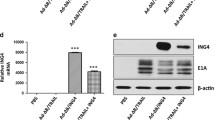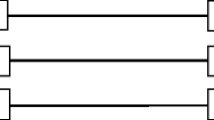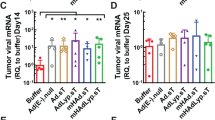Abstract
We developed a recombinant defective adenovirus with an insert of gene encoding extracellular domain of mouse Flt3L (Ad-mFlt3L) under control of cytomegalovirus promoter to investigate the biological efficacy of Flt3L in combination with chemotherapeutical drug, 5-FU, in eliciting an effective anti-cancer immunity in mouse hepatoma and colon cancer model systems. The constructed Ad-mFlt3L efficiently infected hepatoma and colon cancer cells both in vitro and in vivo, leading to a high production of mFlt3L proteins in association with accumulation of DCs, NK cells and lymphocytes in local tumor tissues. Administration of Ad-mFlt3L can protect bone marrow injury caused by 5-Fu and stimulates proliferation and maturation of lymphocytes, APCs and NKs. Intratumoral injection of Ad-mFlt3L followed by an intraperitoneal administration of 5-Fu significantly inhibited tumor growth and cured established tumors. Adenovirus mediated Flt3L gene therapy synergies with chemotherapeutic drug, 5-Fu, in elicitation of long-lasting antitumor immunity. The tumor specific immunity can be adoptively transferred into naïve animals successfully by transfusion of CD3+CD8+ T cells from the treated mice. The data suggests that adenovirus mediated Flt3L gene therapy in combination with 5-Fu chemotherapy may open a new avenue for development of anti-cancer chemogenetherapy.






Similar content being viewed by others
Abbreviations
- Flt3L:
-
Fms-like tyrosine kinase 3 ligand
- NK:
-
Natural killer
- HCC:
-
Hepatocellular carcinoma
- 5-Fu:
-
5-Fluorouracil
- MEM:
-
Minimal essential medium
- Ad-mFL:
-
Adenovirus with an insert of gene encoding extracellular domain of mouse Flt3L
- MTT:
-
3-(4,5-dimethylthiazol-2-yl)-2,5-diphenyltetrazolium bromide
- FBS:
-
Fetal bovine serum
- CMV:
-
Cytomegalovirus
- EFU:
-
Expression-forming unit
- CFU:
-
Colony-forming unit
- BFU:
-
Burst-forming unit
- MOI:
-
Multiplicity of infection
- IHC:
-
Immunohistochemistry
Reference
Borges L, Miller RE, Jones J, Ariail K, Whitmore J, Fanslow W, Lynch DH. (1999) Synergistic action of fms-like tyrosine kinase 3 ligand and CD40 ligand in the induction of dendritic cells and generation of antitumor immunity in vivo. J Immunol 163(3):1289–1297
Chakravarty PK, Alfieri A, Thomas EK, Beri V, Tanaka KE, Vikram B, Guha C. (1999) Flt3-ligand administration after radiation therapy prolongs survival in a murine model of metastatic lung cancer. Cancer Res 59(24):6028–6032
Darcy PK, Haynes NM, Snook MB, Trapani JA, Cerruti L, Jane SM, Smyth MJ. (2000) Redirected perforin-dependent lysis of colon carcinoma by ex vivo genetically engineered CTL. J Immunol 164(7):3705–3712
Djazayeri K, Szilvassy Z, Peitl B, Nemeth J, Nagy L, Kiss A, Szabo B, Benko I (2005) Accelerated recovery of 5-fluorouracil-damaged bone marrow after rosiglitazone treatment. Eur J Pharmacol 522(1–3):122–129
Drakes ML, Lu L, Subbotin VM, Thomson AW (1997) In vivo administration of flt3 ligand markedly stimulates generation of dendritic cell progenitors from mouse liver. J Immunol 159(9):4268–4278
Fernandez NC, Lozier A, Flament C, Ricciardi-Castagnoli P, Bellet D, Suter M, Perricaudet M, Tursz T, Maraskovsky E, Zitvogel L (1999) Dendritic cells directly trigger NK cell functions: cross-talk relevant in innate anti-tumor immune responses in vivo. Nat Med 5(4):405–411
Guo YJ, Che XY, Shen F, Xie TP, Ma J, Wang XN, Wu SG, Anthony DD, Wu MC. (1997) Effective tumor vaccines generated by in vitro modification of tumor cells with cytokines and bispecific monoclonal antibodies. Nat Med 3(4):451–455
Guo Y, Wu M, Chen H, Wang X, Liu G, Li G, Ma J, Sy MS (1994) Effective tumor vaccine generated by fusion of hepatoma cells with activated B cells. Science 263(5146):518–520
Gyobu H, Tsuji T, Suzuki Y, Ohkuri T, Chamoto K, Kuroki M, Miyoshi H, Kawarada Y, Katoh H, Takeshima T, Nishimura T (2004) Generation and targeting of human tumor-specific Tc1 and Th1 cells transduced with a lentivirus containing a chimeric immunoglobulin T-cell receptor. Cancer Res 64(4):1490–1495
Hannum C, Culpepper J, Campbell D, McClanahan T, Zurawski S, Bazan JF, Kastelein R, Hudak S, Wagner J, Mattson J et al (1994) Ligand for FLT3/FLK2 receptor tyrosine kinase regulates growth of haematopoietic stem cells and is encoded by variant RNAs. Nature 368(6472):643–648
He TC, Zhou S, da Costa LT, Yu J, Kinzler KW, Vogelstein B (1998) A simplified system for generating recombinant adenoviruses. Proc Natl Acad Sci USA 95(5):2509–2514
Lyman SD, James L, Vanden Bos T, de Vries P, Brasel K, Gliniak B, Hollingsworth LT, Picha KS, McKenna HJ, Splett RR et al (1993) Molecular cloning of a ligand for the flt3/flk-2 tyrosine kinase receptor: a proliferative factor for primitive hematopoietic cells. Cell 75(6):1157–1167
Lynch DH, Andreasen A, Maraskovsky E, Whitmore J, Miller RE, Schuh JC. (1997) Flt3 ligand induces tumor regression and antitumor immune responses in vivo. Nat Med 3(6):625–631
Maraskovsky E, Brasel K, Teepe M, Roux ER, Lyman SD, Shortman K, McKenna HJ (1996) Dramatic increase in the numbers of functionally mature dendritic cells in Flt3 ligand-treated mice: multiple dendritic cell subpopulations identified. J Exp Med 184(5):1953–1962
Mazzolini G, Qian C, Narvaiza I, Barajas M, Borras-Cuesta F, Xie X, Duarte M, Melero I, Prieto J (2000) Adenoviral gene transfer of interleukin 12 into tumors synergizes with adoptive T cell therapy both at the induction and effector level. Hum Gene Ther 11(1):113–125
McKenna HJ, de Vries P, Brasel K, Lyman SD, Williams DE. (1995) Effect of flt3 ligand on the ex vivo expansion of human CD34+ hematopoietic progenitor cells. Blood 86(9):3413–3420
Peron JM, Esche C, Subbotin VM, Maliszewski C, Lotze MT, Shurin MR. (1998) FLT3-ligand administration inhibits liver metastases: role of NK cells. J Immunol 161(11):6164–6170
Sang H, Pisarev VM, Munger C, Robinson S, Chavez J, Hatcher L, Parajuli P, Guo Y, Talmadge JE (2003) Regional, but not systemic recruitment/expansion of dendritic cells by a pluronic-formulated Flt3-ligand plasmid with vaccine adjuvant activity. Vaccine 21(21–22):3019–3029
Shaw SG, Maung AA, Steptoe RJ, Thomson AW, Vujanovic NL. (1998) Expansion of functional NK cells in multiple tissue compartments of mice treated with Flt3-ligand: implications for anti-cancer and anti-viral therapy. J Immunol 161(6):2817–2824
Steptoe RJ, Fu F, Li W, Drakes ML, Lu L, Demetris AJ, Qian S, McKenna HJ, Thomson AW. (1997) Augmentation of dendritic cells in murine organ donors by Flt3 ligand alters the balance between transplant tolerance and immunity. J Immunol 159(11):5483–5491
Wang H, Dai J, Hou S, Qian W, Li B, Ma J, Fan X, Zhao J, Yang S, Sang H, Yang Q, Wang R, Guo Y. (2005) Treatment of hepatocellular carcinoma with adenoviral vector-mediated Flt3 ligand gene therapy. Cancer Gene Ther 12(9):769–777
Wang A, Braun SE, Sonpavde G, Cornetta K. (2000) Antileukemic activity of Flt3 ligand in murine leukemia. Cancer Res 60(7):1895–1900
Ye Z, Hellstrom I, Hayden-Ledbetter M, Dahlin A, Ledbetter JA, Hellstrom KE. (2002) Gene therapy for cancer using single-chain Fv fragments specific for 4-1BB. Nat Med 8(4):343–348
Acknowledgments
This work was supported in part by the grants from National Natural Science Foundation of China, Shanghai Commission of Science and Technology, E-Institutes of Shanghai Universities Immunology Division and Ministry of Science and Technology of China (973 and 863 projects) as well as a special grant from Shanghai Pudong Bureau of Science and Technology of China.
Author information
Authors and Affiliations
Corresponding author
Additional information
Sheng Hou, Geng Kou, and Xiaoqiang Fan are contribute equally to this paper.
Rights and permissions
About this article
Cite this article
Hou, S., Kou, G., Fan, X. et al. Eradication of hepatoma and colon cancer in mice with Flt3L gene therapy in combination with 5-FU. Cancer Immunol Immunother 56, 1605–1613 (2007). https://doi.org/10.1007/s00262-007-0306-3
Received:
Accepted:
Published:
Issue Date:
DOI: https://doi.org/10.1007/s00262-007-0306-3




